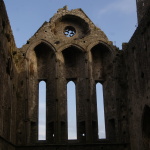I wrote last week about the value of getting lost in a strange city and the benefits of B&Bs. This week’s post continues my thoughts on a travel experience that really connects you with your destination and its people.
I highly recommend walking tours offered by local students or retirees. Rick Steves directs you to these sorts of tours in his excellent travel guides. These folks are a wealth of stories about their homes towns.
Just talk to people in general. If you’re not naturally a friendly person, force yourself a little out of your comfort zone; that’s what travel is for. My French is pretty bad, but one evening at a fruit market in Paris, I noticed a fruit that I’d never seen before, and managed to point and ask “Qu’est-que c’est?” and the owner gave me handful of the loveliest, sweet little yellow plums to try. Naturally, I ended up buying a whole bag of them. In Rome and Paris, we got to know some of the regulars by going into the same coffee shop every morning. In Ireland, just by opening conversations with people, we made so many new friends. We met a Greek physician and learned all about the lingering effects of the financial crisis in Greece. We met an American expat who drove into the Wicklow Mountains with us to show us the best spot for viewing the mountains and Guiness Lake. Walking to dinner through a park one evening, we missed the Early Bird Special because we stopped to pet someone’s dog and got into a half hour conversation with him about his own travels. We treasure these moments of connection as much as our photographs of the lovely scenery.
My final plea is to learn something ahead of time about the area or country you are about to visit. If you are going to a place where you don’t speak the language, get the Rosetta Stone and learn just a bit. Read the history and literature of the country. You will make surprising connections and enrich your understanding of other places that you’ve visited and your own home. Reading Les Miserables while in France helped me to understand why there is a Victor Hugo Street or Victor Hugo café in every French town, big or little. And when I noticed an O’Connell Street in every Irish town, I had a hunch that O’Connell must have had something in common with Hugo – and that turned out to be right. Although Hugo was a writer and O’Connell was a politician, both of them earned the undying devotion of their countries simply by loving the common people so deeply.
So, please go away. Go away in your own country or abroad. Go away on a tour, or wing it as I’m advocating. But, by all means, please go away. You will be so enriched by it. No lie.

